Chia Boon Leong: The Twinkle-Toed Olympian
Although short in stature, footballer Chia Boon Leong was a force to be reckoned with.
By Nick Aplin
The Manila Times called him “small but terrible”. Shanghai’s North-China Daily News described him as a “spark-plug and a glutton for work”. Singapore’s Sunday Tribune said he was as “swift as a hare, with brilliant ball control and unlimited stamina”.1
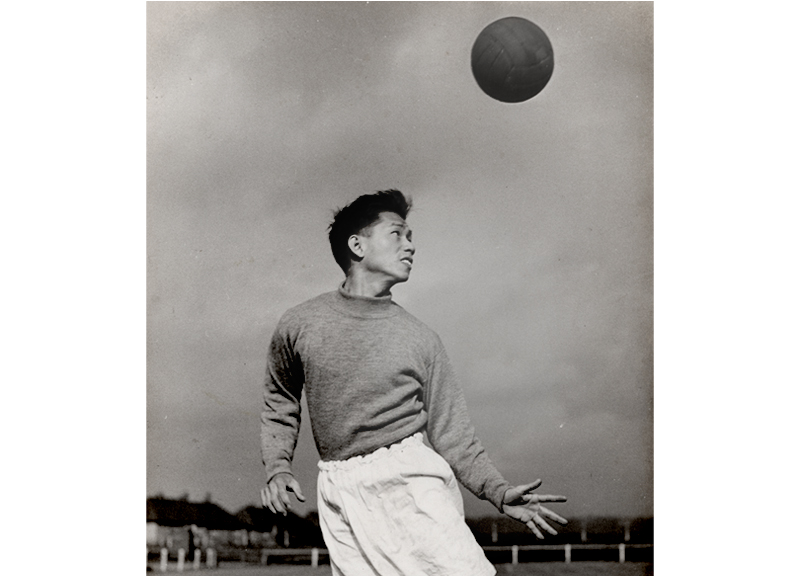
In a report of a 1948 match between Rovers S.C. and RAF Seletar, the Malaya Tribune wrote that the year’s “most spectacular goal was scored by Chia Boon Leong. Receiving the ball near mid-field from [Gan] Kee Siang, he cleverly worked his way up the Seletar goal mouth, eluding three defenders on the way and when faced with the goalkeeper, deftly placed the ball into the net wide off him. The entire solo move was so neatly executed that the first to congratulate him were the Seletar defenders”.2
Chia, who died in December 2022 at the age of 97, is widely considered to be one of the most talented and highly regarded football players ever to represent Singapore. He acquired the nickname “Twinkle Toes” after John Mahon, former English international player and coach of the visiting Swedish Gothenburg team, told his men during a match in December 1951: “Watch that little fellow, with the twinkling feet, he works hard, dribbles hard, and is outstanding both in attack and defence.”3
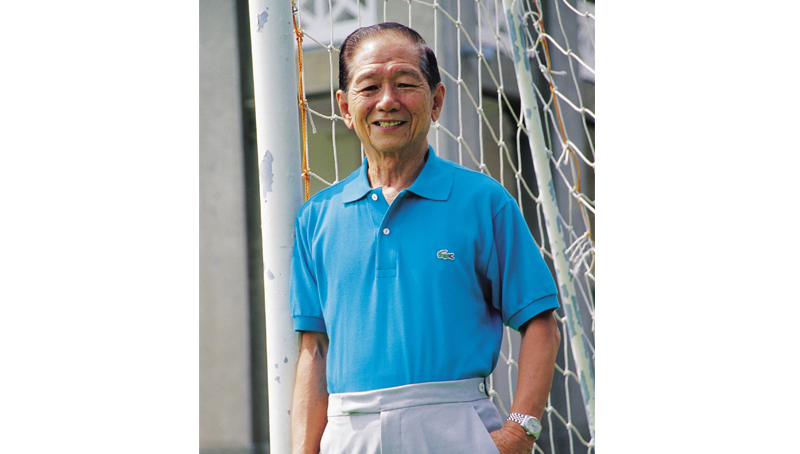
One of Chia’s major accomplishments was representing China’s soccer team at the 1948 London Olympics (he was one of three Malayan Chinese footballers chosen along with Yeap Cheng Eng and Chu Chee Seng).4 Chia later became a household name in the Asian football world during the immediate postwar years. His active playing career also coincided with a period of Singapore’s dominance of the Malaya Cup during the early 1950s. He competed at every available level, and after retiring became manager of the Singapore soccer team briefly as well as a council member of the Football Association of Singapore.
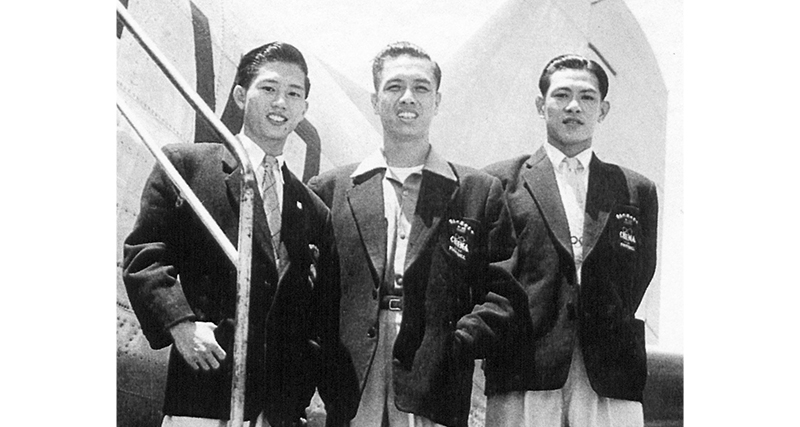
Early Life
Born in Singapore on 1 January 1925, Chia was the sixth of seven sons. He lived in Pasir Panjang and was educated first at Pasir Panjang English School where he picked up the sport. He then attended Raffles Institution, excelling not only in soccer but also in athletics, hockey and rugby. He was also a founding member of Pasir Panjang Rovers football team, which later became one of the leading clubs in Singapore.5
Even though Chia was short, at 1.6 m, and physically slender, he compensated with his speed, exceptional ball skills and quick brain. He was inspired by the exploits of individuals such as Dolfattah, Mat Noor and Chua Boon Lay, who played for Singapore in the Malaya Cup in the late 1930s.
Chia was just 17 years old when the Japanese captured Singapore in February 1942. He narrowly avoided being killed during Operation Sook Ching, a military operation aimed at weeding out suspected anti-Japanese elements at the start of the Japanese Occupation.6 Chia and his family had moved to Tiong Bahru, which they thought was safer, and he was told to report to an open area opposite a police station. “As a schoolboy I just carried on and followed instructions. We lined up, one by one, to face a Japanese soldier and some were told to go to a lorry, I did not know why then,” he recounted to the Straits Times in February 2022. “It was only some time later that we were told those on the lorries were taken somewhere else to be executed.”7
During the Occupation years, Chia was able to continue playing football when the Japanese formed the Syonan Sports Association.8 He also became a member of the Pasir Panjang Rovers football team that in 1943 won the Alsagoff Shield, an eight-game league tournament.9
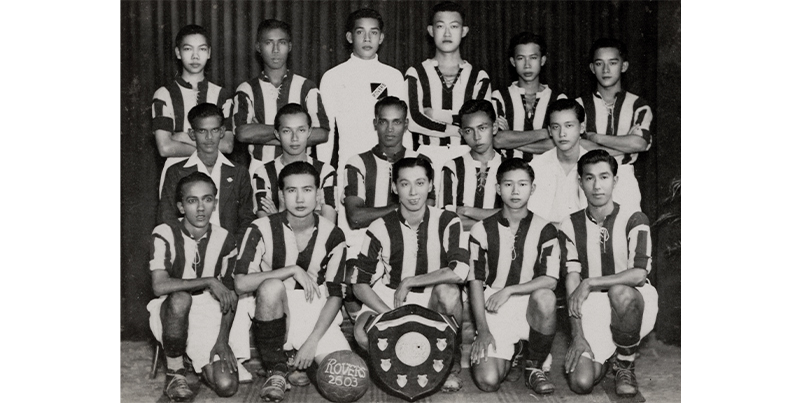
The Postwar Years
Immediately after the war, Chia began establishing himself as one of Singapore’s top footballers. In 1946, he played for Base Ordinance Depot, the Rovers Sports Association and the Singapore Chinese Football Association.
His star rose even further when he was chosen to be one of 18 footballers from Malaya and Singapore to form a Malayan Chinese touring team known as Lien Hwa (United Malayan Chinese).10 Between November and mid-December 1947, Lien Hwa toured Bangkok, Hong Kong, Shanghai and Manila, playing a total of 22 games against local teams. The final tally was an impressive 15 wins, three losses and four draws.
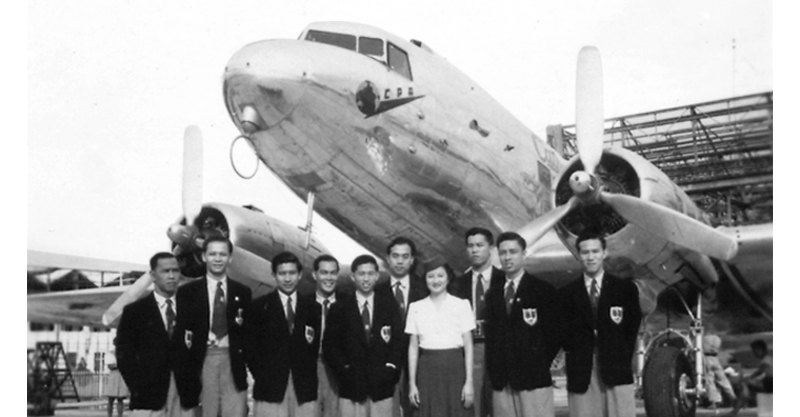
In an interview with New Nation in April 1975, Chia revealed that one of his fondest football memories arose during that tour, though not because of a game, but for the post-match reception given by the crowds.11
On 19 November 1947, Lien Hwa played Shanghai’s first-division champions Tung Hwa, beating them 5–3 in a match in Shanghai’s Canidrome stadium before a crowd of 12,000. Although Chia did not score a goal in the game, his performance caught everyone’s eye. The China Press wrote that Chia “won the hearts of the fans and Tung Hwa players with his tireless game. He was almost in every movement, aiding the defence and forward-line and showed beyond doubt that he knew how to play the inside-forward berth more than well”.12
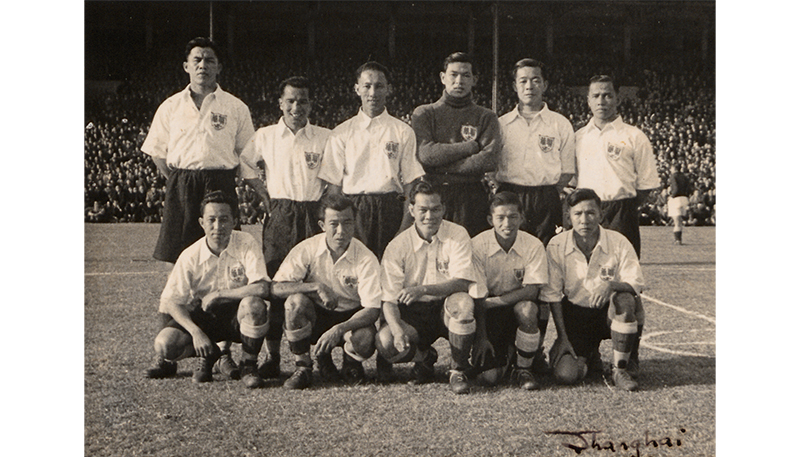
The North-China Daily News reported that Chia had won the admiration of local fans and described his stamina as amazing. “One minute he is seen helping his defence and the next one sees him rushing through the opposing halves and backs. Although Chia personally did not score a single point, he took part in almost every defence movement of his side”.13
Such was his performance that the crowd of presumably Tung Hwa supporters mobbed Chia as he left the stadium to head towards the bus. “They were so natural and spontaneous in their feelings. The crowds surged towards me in the stadium and I had to go out by another way. The police had to form a circle around me to let me through. I still flush with pride whenever I think of this incident,” he recalled. “It was [a] once-in-a-lifetime feeling.”14
Playing in the Olympics and the Malaya Cup
Partly as a result of these performances, Chia was selected to represent China at the 1948 London Olympic Games. At the time, although a British subject, under China’s rules, he was still considered a Chinese player by dint of his ethnicity.
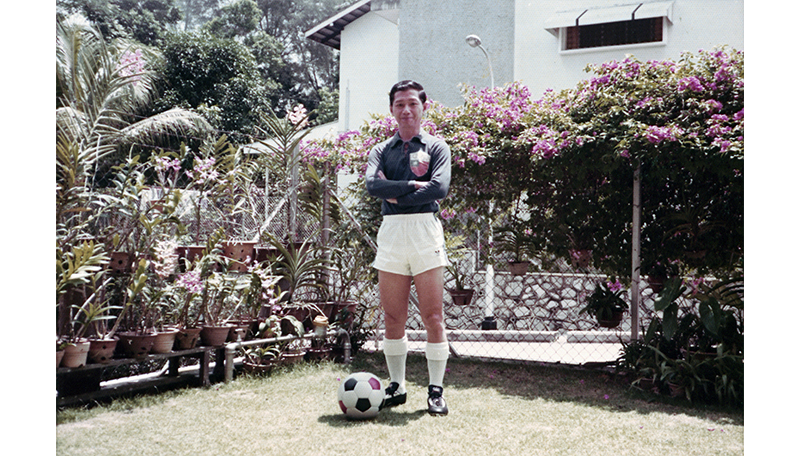
Though the China team eventually lost 4–0 to Turkey on 2 August 1948, Chia “created a favourable impression with his speed and methodical play” and “had a grand time in London”. “The game was played at a terrific pace. The Turks were much bigger built than us. They were able to score only once in the first half,” Chia told the Straits Times on his return. During the match, centre forward Chu Wing Keung sustained an injury and the team played with just 10 men in the second half. The heavy rain made matters worse for the Chinese.15 The 4–0 loss was no disgrace.
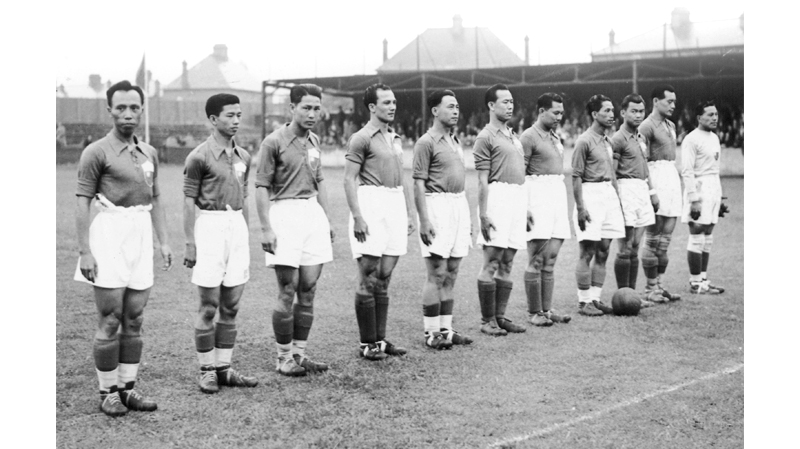
The Malaya Tribune reported that Chia’s photo appeared twice in the London newspapers, and that Chia “came for special mention for his speed, tricky and constructive play”. While in London, Chia also shook hands with the king and queen of England at a royal reception for athletes.16
After the Olympics, Chia continued to play for Singapore. The Malaya Cup resumed in 1948 with a combination of prewar veterans and new blood. That year, the Singapore team failed to reach the final, being eclipsed by Negeri Sembilan,17 but Chia showed his usual mettle.
After suffering from a brief loss of confidence in 1949, Chia bounced back to claim a place in the All-Singapore team – a squad that included British Services players and local players. He then went on to play a pivotal role in Singapore’s successful bid in recapturing the Malaya Cup in 1950. “The first goal by Chia Boon Leong was as unexpected by Singapore supporters as it was by the Penang goalkeeper,” reported the Singapore Standard.18 It was the first time Singapore had won the cup in nine years. Chia also helped Singapore retain the trophy in 1951 and 1952.19
In May 1954, Chia was a member of the team representing Singapore at the second Asian Games in Manila.20 In August later that year, he was voted the most popular footballer in Malaya in a nationwide competition sponsored by Fraser and Neave, and won a two-month training stint with the London County Council College of Physical Education and Arsenal Football Club.21
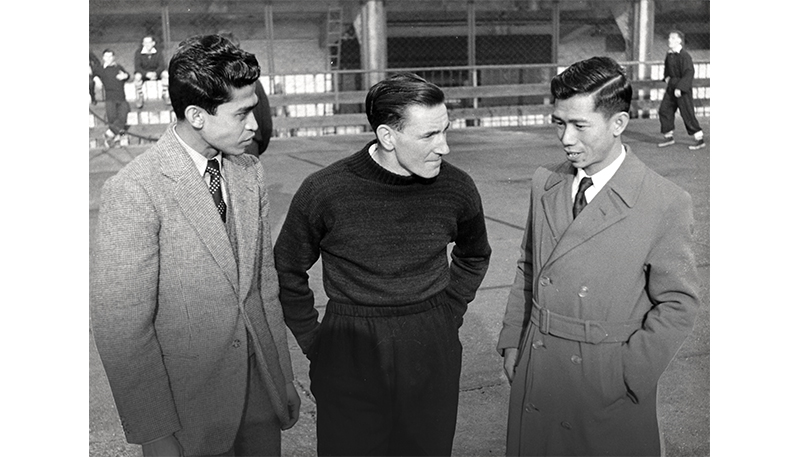
Sadly, in February 1956, the Singapore Standard reported that Chia will “definitely not play for Singapore in this year’s Malaya Cup soccer matches”. “I have been playing soccer from the age of ten, but now I find it does not hold the same appeal for me as it did before,” Chia said.22 He had just turned 31 at the time.
He then devoted time to his family and his career as a financial executive with Rediffusion.23 In a 1975 interview, Chia agreed that he could have continued to play for a few more years. “But, somehow, I couldn’t get over the feeling that it was better to beat a graceful exit than to be booed out of Jalan Besar Stadium,” he said. “I realised that I was losing a bit of my touch and I didn’t want to give any occasion for the crowd to get fed up with me,” he added.24
Post-Retirement Career
Chia did not give up football entirely though. In 1974, he was made a council member of the Football Association of Singapore, and in 1978 he was appointed manager of the Singapore soccer team, a role he held briefly.25 In August 1978, Chia participated in a goodwill tour to the Soviet Union under the Cultural Exchange Programme. In the party was a young Fandi Ahmad.
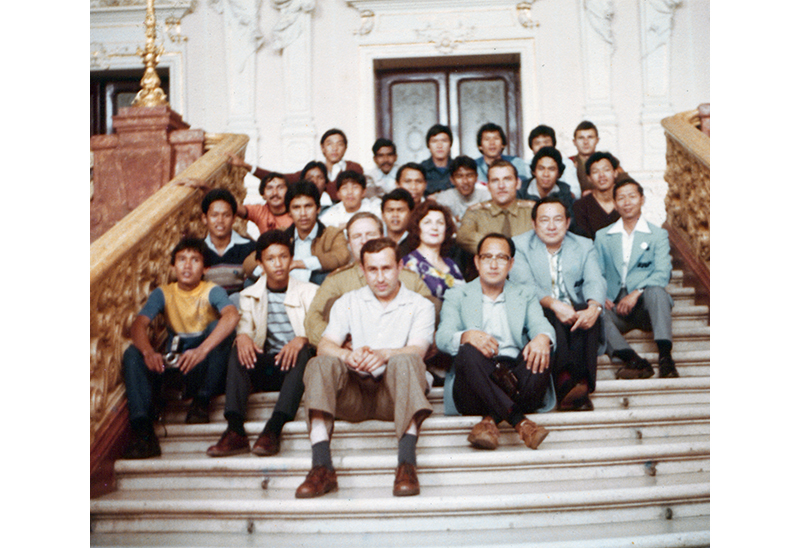
I am honoured to say that I knew Chia personally. I first met him about 20 years ago at a service at Barker Road Methodist Church and I recognised him from afar. He was his mid-70s by then, and I recall that he was dressed very sharply. I approached him and he cheerfully confirmed his identity.
Once we made the football connection, it did not take long before my wife and I were invited to his home for homemade kueh (cake) and to talk about soccer. We would pore over his photo albums and newspaper clippings. He was very proud that he had represented Singapore at the 1954 Asian Games and China at the 1948 London Olympics. At the same time, he was very humble as well. That was one enduring quality of his.
Remarkably, even in the last months before his death at 97, Chia still led an active life. On 31 August 2022, he attended the launch of the book, Roar: Football Legends of Singapore, at Jalan Besar Stadium where a plaster cast of his left foot was unveiled.26 Chia died of pneumonia on 20 December that year. He is survived by his wife Lily Lim and their three sons. Writing on Facebook, his second son Tony said: “Despite his failing health, (dad) was very concerned for my mum, telling her he was sad to be leaving her. We will miss him dearly, especially at family gatherings. I will have no expert to watch football games with any more.”27
Between 22 October and 11 December 1947, the Lien Hwa team played 22 games around Asia. In total, Lien Hwa won 15 matches and lost three. Four matches ended in a draw.
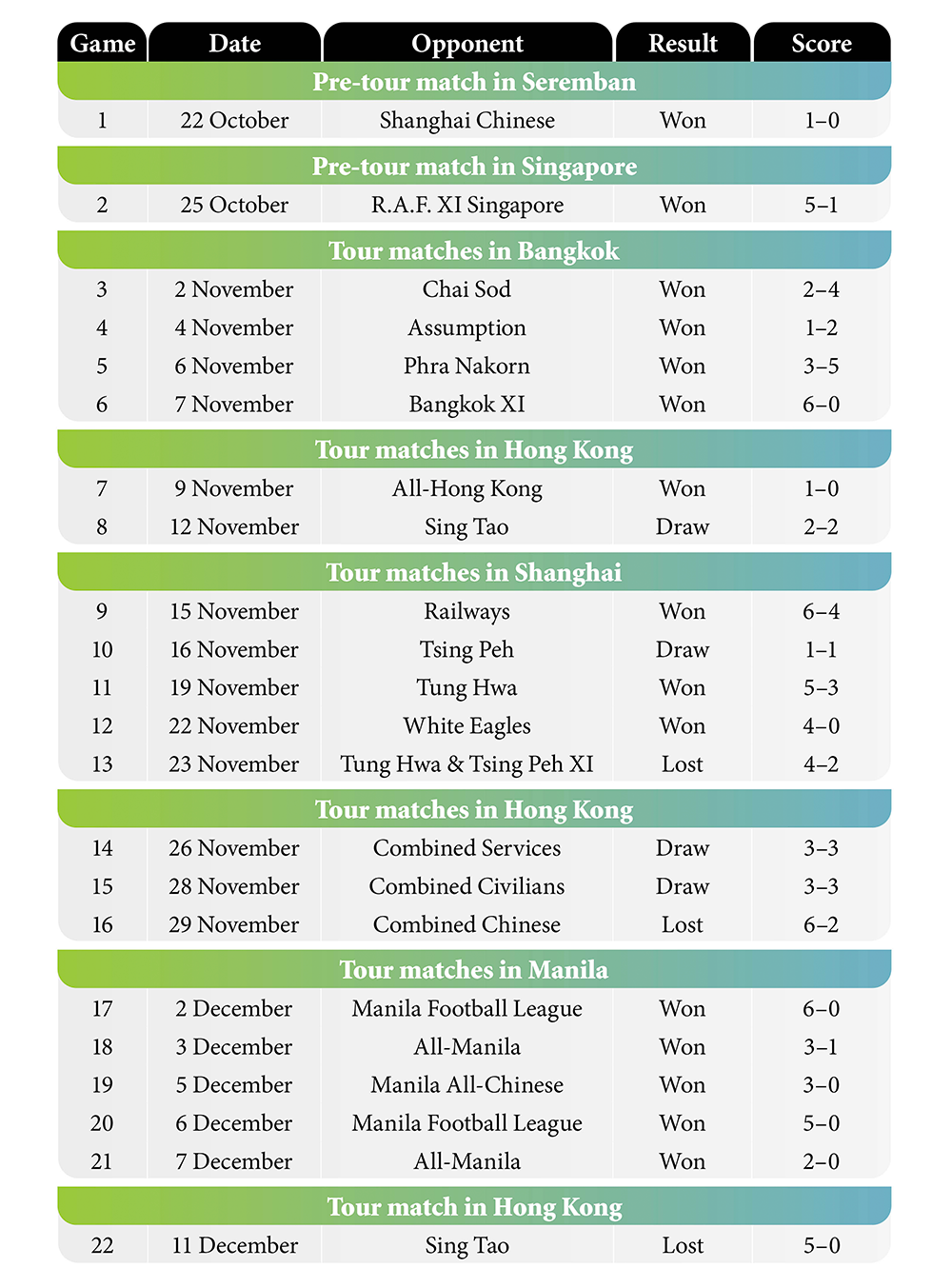
Dr Nick Aplin is the Deputy Director (Sport Heritage) at Sport Singapore. He is the author of Sport in Singapore: The Colonial Legacy (2019) and Sport in Singapore: The Rocky Road to Kallang Park (2023).
NOTES
-
“The Care and Precision He Put Into His Moves Showed His Uncanny Ball Sense…,” New Nation, 18 April 1975, 10–11. (From NewspaperSG) ↩
-
“The Care and Precision He Put Into His Moves Showed His Uncanny Ball Sense….” ↩
-
“Goths Praise Twinkle Toes Boon Leong,” Singapore Free Press, 13 December 1951, 7. (From NewspaperSG) ↩
-
“Chia Boon Leong, Yeap Cheng Eng and Chu Chee Seng, the Three Malayan Chinese Footballers Who Represented the China Olympic Soccer Team at the World Olympics, Are Seen at Bayan Lepas Airport, Penang, on Their Return from London,” Straits Budget, 2 September 1948, 18. (From NewspaperSG) ↩
-
“Twinkle, Twinkle Little Star…,” New Nation, 18 April 1975, 10–11. (From NewspaperSG) ↩
-
Ng Keng Gene, “Ex-footballer Recounts Japanese Occupation, Being Screened for Execution and 1948 Olympics,” Straits Times, 13 February 2022, https://www.straitstimes.com/singapore/former-spore-footballer-chia-boon-leong-recounts-the-occupation-years-from-execution-screening-to-1948-olympics; Stephanie Ho, “Operation Sook Ching,” in Singapore Infopedia. From National Library Board Singapore. Article published 17 June 2013. ↩
-
Ng, “Ex-footballer Recounts Japanese Occupation, Being Screened for Execution and 1948 Olympics.” ↩
-
Ng, “Ex-footballer Recounts Japanese Occupation, Being Screened for Execution and 1948 Olympics.” ↩
-
David Lee, “S’pore’s Only Olympic Footballer ‘Twinkletoes’ Chia Boon Leong Dies at 97,” Straits Times, 21 December 2022, https://www.straitstimes.com/sport/football/obituary-s-pore-s-only-olympic-footballer-twinkletoes-chia-boon-leong-dies-at-97. ↩
-
“Malayan Chinese Picked for Tour,” Straits Times, 29 September 1947, 8. (From NewspaperSG) ↩
-
Sonny Yap, “The Match of His Career…,” New Nation, 18 April 1975, 10–11. (From NewspaperSG) ↩
-
Yap, “The Match of His Career….” ↩
-
Yap, “The Match of His Career….” ↩
-
Yap, “The Match of His Career….” ↩
-
“Malayan Olympic Players Return,” Straits Times, 26 August 1948, 18. (From NewspaperSG) ↩
-
“Boon Leong: ‘I’m Luckiest of Lot’,” Malaya Tribune, 23 August 1948, 8. (From NewspaperSG) ↩
-
“Negri All Set for Cup Final,” Straits Times, 5 December 1948. (From NewspaperSG) ↩
-
“Singapore Wins Malaya Cup,” Singapore Standard, 15 August 1950, 10. (From NewspaperSG) ↩
-
“Singapore Blaze to 6–0 Win,” Straits Times, 3 September 1951, 12; “Bakar Goal Gives Singapore the Cup Again,” Singapore Standard, 13 October 1952, 8. (From NewspaperSG) ↩
-
“We Expect to Reach Soccer Finals – Soh,” Straits Times, 30 April 1954, 14. (From NewspaperSG) ↩
-
“E.C Dutton and Boon Leong for England,” Straits Times, 1 August 1954, 1; “Twinkle, Twinkle Little Star…,” New Nation, 18 April 1975, 10–11. (From NewspaperSG) ↩
-
“‘Twinkle Toes’ Says Goodbye,” Singapore Standard, 24 February 1956, 14. (From NewspaperSG) ↩
-
Lee, “S’pore’s Only Olympic Footballer ‘Twinkletoes’ Chia Boon Leong Dies at 97.” ↩
-
“Fandi on FAS Council,” Straits Times, 25 March 2001, 2; Joe Dorai, “Chia Named Manager Again,” Straits Times, 8 November 1979, 33. (From NewspaperSG) ↩
-
Sazali Abdul Aziz, “Football: Old Is Gold As Former Stars Return to Jalan Besar for Book Launch,” Straits Times, 31 August 2022, https://www.straitstimes.com/sport/football/football-old-is-gold-as-former-stars-return-to-jalan-besar-for-book-launch. ↩
-
Lee, “S’pore’s Only Olympic Footballer ‘Twinkletoes’ Chia Boon Leong Dies at 97.” ↩

